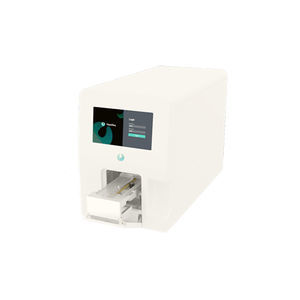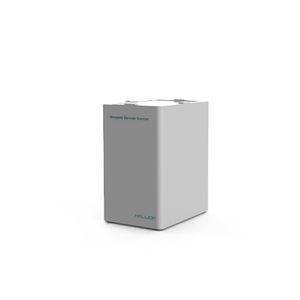
- Laboratory
- Laboratory medicine
- Colon cancer test kit
- Kelliop Pte Ltd.
Colorectal cancer assay kit biomarqueursFFPE tissuesclinical
Add to favorites
Compare this product
Characteristics
- Applications
- colorectal cancer
- Tested parameter
- biomarqueurs
- Sample type
- clinical, FFPE tissues
- Analysis mode
- for PCR
Description
1.A multiplexed test
2.Accuracy and reliability of the results
3.Low sample input
Features
1. Simultaneous detection of seven monomorphic homopolymer biomarkersassessment
2. Fast results – 1 hourfrom sample to result
3. Evaluate results with the RapidSeq126®report software
4. Tested with paraffin-embedded samples
This RapidSeq MSI Assay is a PCR-based melting detection assay intended to qualitative detect a novel panel of seven monomorphic homopolymer biomarkers (MRE11, SULF2, RYR3, SEC31A, BTBD7, ACVR2A, and DIDO1) in formalin-fixed, paraffin-embedded (FFPE) tissue sections from human cancer tissue clinical samples. The Assay based on RapidSeq® platform automates the entire process from nucleic acids are liberated from FFPE sample, PCR amplified and melting curve assay to report of MSI status in less than 1 hour.
Biomarkers
seven monomorphic homopolymer biomarkers:
MRE11, SULF2, RYR3, SEC31A, BTBD7, ACVR2A, and DIDO1
Product Specifications
Panel
RapidSeq PHLOSS Assay of a novel panel of seven monomorphic homopolymer biomarkers
Reactions
3 times/target for a sample
Internal control
housekeeping gene GAPDH
Sample types
paraffin-embedded samples
Turnaround time
—1hour from sample to answer
To be used with
RapidSeq126®Instrument
Data analysis
RapidSeq126®report software
Scientific Background
Determination of mismatch repair (MMR) and/or microsatellite instability (MSI) status in colorectal cancer (CRC) is recommended to aid in the identification of patients with Lynch syndrome or as a prognostic indicator. In addition, it is becoming increasingly important as predictive biomarker for cancer immunotherapy.
Catalogs
No catalogs are available for this product.
See all of Kelliop Pte Ltd.‘s catalogs*Prices are pre-tax. They exclude delivery charges and customs duties and do not include additional charges for installation or activation options. Prices are indicative only and may vary by country, with changes to the cost of raw materials and exchange rates.



